Photographs: (inset) Sreeram Selvaraj Shobha Warrier in Chennai
Veteran writer, producer and director Bhagyaraj, who reaped rich harvest in the 70s, 80s and 90s, is back with his new Tamil film Siddhu (Plus 2, First Attempt) with his son Shantanu as the hero.
Here's what he has to say about making films for today's generation, and more.
Is there any difference in making a film and telling a story to the audience of the 80s and today?
There are lots of differences. Today's films are technically more advanced. The pace has changed from slow to fast. The general audience has become more educated and mature. So, the way you narrate the story also has changed. If we explained a situation in 2-3 scenes earlier, now, with just one scene, they understand what you want to say.
Is there any difference in the way you write the screenplay now?
Today the average age of an audience is 35! And they prefer fast moving films with less melodrama. On the other hand, earlier, it was more drama and melodrama. They also want more entertainment in less time. So, I have changed my way of writing the screenplay to suit the needs of today's audience.
'Antha Ezhu Naalkal was remade in Hindi twice'
Image: A scene from SiddhuTo change your style, do you have to be very observant?
Of course, we have to observe what is happening in the world. And, I've been watching how my kids are growing up. So, it is not that difficult to adapt to the new style. We shouldn't be obstinate about change. Instead of remaining rigid, a filmmaker and a story teller has to change and adapt to new things. When you are aware of who comes to the theatre to watch the film, you change your style accordingly.
How did the idea of your latest film Siddhu (Plus 2 First Attempt) come to you?
First, I thought of what I should do to make a film that would be liked by youngsters. It was a journalist from Kumudam who outlined the story to me. He wanted me to develop a script for him. Half way through, he left the project and we had to abandon it. But somehow, I loved the story line. So, I bought the rights from him to develop it into a script. I have given the credit for the story to him. The judgement of the writer and creator is very important and I was sure that it would come out well.
Do you feel if you have a good story, it will not make any difference if the audience belonged to the 80s or today?
If it is a good story, it will be liked by all generations. For example, I made a Tamil film Antha Ezhu Naalkal which was remade as Woh Saath Din in Hindi in the eighties. Later, the same story appeared as Hum Dil De Chuke Sanam with Salman Khan, Aishwarya Rai, and Ajay Devgan.
'I want to give a small message through this film'
Image: A scene from SiddhuSanjay Leela Bhansali made the film...
Yes, there is absolutely no difference in the story. When we asked him, he said that he didn't know it was the same story. Only after half the film was over, he realised it was the same story, he said. That film also was a success and it won some awards in festivals. What I want to say is, if you have a good story, people both the young and old will like it.
Similarly, I made Kabadi Kabadi in Tamil with my assistant Pandiaraj directing it, based on my story. It was remade in Hindi years later and the movie was successful.
What is Siddhu (Plus 2, First attempt) about?
I want to give a small message through this film. The film is also a love story. All parents want to give good education to their children, and they want their children to come out first all the time. But the truth is, not all children are academically brilliant, and not all can excel in studies.
But each child has potential and has talent in something. Parents should not think that if a child is not academically brilliant, he will not come up in life. It is the duty of the parents and teachers to find out what the hidden talent each child has. They should let the child excel in that field. What parents do is, they get into depression if their child is not academically good. They feel that he has no future in life. It is not true.
How do you think we got a Sachin Tendulkar? There are so many people with extraordinary talent.
'Because I am his father, Shantanu was arguing with me all the time'
Image: A scene from SiddhuWhat hidden talent does Siddhu have in the film?
You will come to know only in the second half of the film! It is not his parents but his girl friend who helps him discover his talent and encourages him. Siddhu's father, a college principal is ashamed that his son is not good in studies. The girl tells him that he has failed both as a father and a teacher!
In her case also, she has certain ambitions in life which her parents refuses to see. They only want to marry her off. Her parents are more bothered about their own desires than hers.
Both the girl's and Siddhu's life would have gone in a direction not desired by them but for the support both of them give each other.
So, the film is from a youngster's point of view...
Yes. I want to tell parents that they have to open their eyes to the dreams and ambitions of their children.
How was it directing your own son Shantanu in the film? Was it difficult?
The only difficulty I had was, while the other actors listen to you, he doesn't [laughs]. He obeys other directors without a question but as I am his father, he wants to question me about everything. He can't take such liberties with the others; only with his father, he can do all that! Because I am his father, he was arguing with me all the time.
In my case also, I can tell the other actors to do what I tell him. But this fellow would go and complain about me to his mother [laughs].
'I never forced my ideas on my children'
Image: A scene from SiddhuAs a director, are you satisfied with his performance?
He is talented and I am satisfied with him.
You directed your daughter in Parijatham. Was there any difference in directing your son and daughter?
My daughter was very obedient. She only asked me questions if she had any doubts. When I directed my son first, he was young and did what I told him to. Now that he is all grown up, he wants to argue with me! I said okay to many of his suggestions as he is young and the subject is young. He would know certain things better than me.
When your children expressed their desire to be actors, were you happy?
I never forced my ideas on my children. I did not get permission to act in films from my family. My family did not consider films as a profession at all. So, I never forced my children into films. I gave them proper education and after that, they expressed their desire to act in films. After all, they are children of two actors.
'I couldn't say no to my daughter when she wanted to act'
Image: A scene from SiddhuGenerally those in the film industry do not allow their daughters to be actors but you first directed your daughter...
How can I say 'no' to her when her mother too was an actress! So, when she said she wanted to act, I agreed.
Are you satisfied with the way Siddhu has shaped up? Do you feel you understand the minds of the young crowd?
Yes. Human beings are the same, and their basic feelings are the same too. We have also passed through the age and experienced what they experience now. After 5-10 years, these young men cross that age and a new crop of youngsters will take over. That is life.

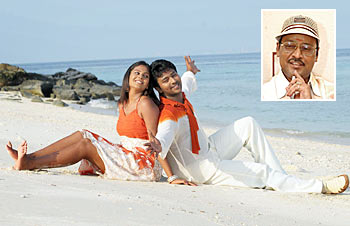
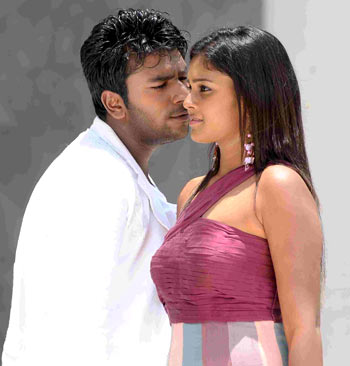
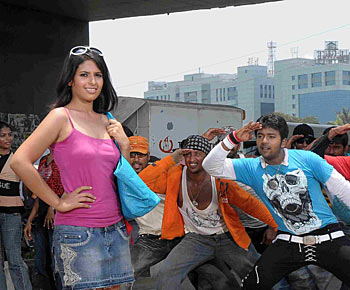
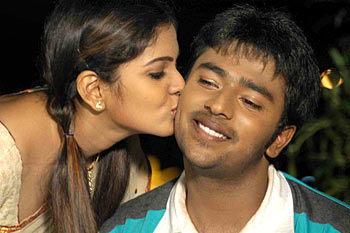
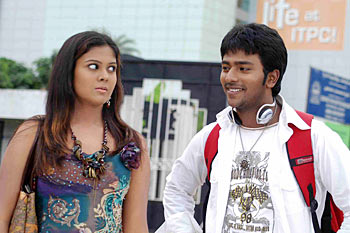
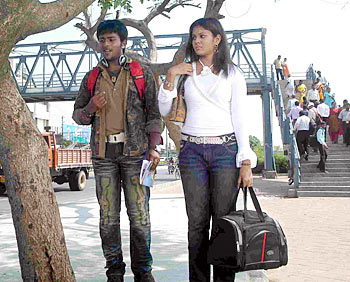
Comment
article